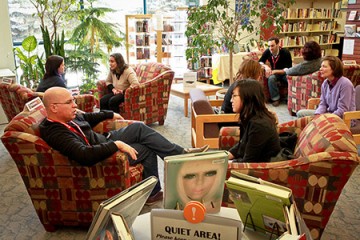In 2015, an aspiring female scientist might not even think twice about her gender as a career obstacle. Many of the barriers that existed for past generations of women in the field can seem downright irrelevant or antiquated today.
But just because it's not overt doesn't mean it's not there, says Karen Fleming, a professor of biophysics in Johns Hopkins' Krieger School of Arts and Sciences.
"We were raised our whole lives to hear that we can do what we want," Fleming says of modern generations of women in the sciences. So why, then, do females continue to drop out of STEM (science, technology, engineering, and mathematics) careers at every level, particularly in academia? "It occurred to me that younger women, the grad students and postdocs, might not be aware of the unconscious bias that still exists in the STEM fields," she says.
With that in mind, the professor last year launched a series of workshops at Hopkins exploring gender equity in the sciences through readings and discussions of social psychology research. They ended up attracting "a much broader audience than I thought," Fleming says, with staff and students from various backgrounds participating.
Dominic Scalise, a PhD candidate in Chemical and Biomolecular Engineering, was among the numerous men who showed up for the events. One challenge he observed was the "preaching to the choir" phenomenon. "I was struck by the fact that the people going already agreed that there was a problem," he says. "We wanted to try to get a more critical mass."
So with the help of Scalise and others, the concept is evolving this semester by offering a pilot program of reading groups within the Chemical and Biomolecular Engineering Department, along with a capstone event before winter break. The expansion is possible thanks to a $2,500 Diversity Innovation Grant the team won through last spring's Idea Lab crowdsourcing challenge.
Fleming is also continuing with her interdepartmental workshops this semester, the first of which took place Sept. 15. A handful more are planned, to be promoted on her Achieving Gender Equity in Science blog.
The pilot program is more concentrated, bringing together one or two grad student representatives from each of the 18-some labs in Chemical and Biomolecular Engineering for a monthly reading group. The first takes place Oct. 1. Scalise says participants may explore topics such as "the confidence gap," the studied trend whereby male scientists are more likely to speak up whether or not they're certain of their accuracy, while women are more apt to hesitate.
The goal is to increase "the number of people in this community who are thinking about these issues," Scalise says. If the pilot's a success, other departments might adopt similar frameworks in the future.
The broader capstone event at the semester's end will ideally bring in a high-profile speaker or a panel of faculty members discussing their experiences, Fleming says.
Although the concept was born of concerns in the STEM fields, Fleming's workshops and the capstone event are open to anybody at Johns Hopkins, she says. "I think in any male-dominated field, the challenges women face are going to be similar."











